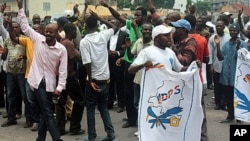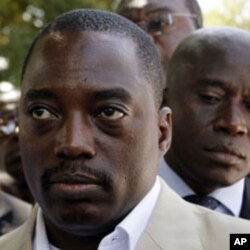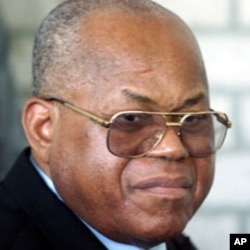Presidential campaigning begins this week in the Democratic Republic of Congo. But opposition parties and international election observers have expressed concern next month's poll may be postponed. VOA West Africa Correspondent Scott Stearns has more.
Incumbent President Joseph Kabila's biggest challenger in this vote is longtime opposition leader Etienne Tshisekedi.
Unlike in the last presidential election, Congo's constitution no longer requires a candidate to win more than 50 percent of the vote. Without a second round, whoever gets the most votes wins.
With official campaigning set to begin Friday, President Kabila says Congo is ready.
"If the electoral commission tell us they are ready, then we also have to be ready. I am sure that up to now they are ready and we will go for elections."
Opposition parties say the electoral commission is not ready for the poll because the preparation and distribution of voting materials is behind schedule and voter registration was not honestly conducted. Jacquemin Shabani is the secretary general of Tshisekedi's Union for Democracy and Social Progress party.
Shabani says the party has notified the electoral commission in writing about what it says are various irregularities in the process, including questions of identification during voter registration. Shabani says it is important that this vote be credible and transparent, so the process must be adjusted.
President Kabila's opponents say they will not know the extent of problems with voter lists until they are published at each local polling station. But the locations of more than 62,000 polling stations have not yet been announced, slowing the process further.
Election observers from the U.S.-based Carter Center say there are serious threats to the election schedule that must be addressed now. Baya Kara heads the Carter Center observation team in Kinshasa.
Kara says that if the electoral commission stays on course with the printing and delivery of ballot papers, and if ballot boxes are delivered on time and poll workers are hired and trained promptly, the election date of November 28 can be maintained. But Kara says this is a challenge that needs a huge effort, including the publication of voter rolls as fast as possible.
The electoral commission says the printing of ballot papers in South Africa is underway and the delivery of ballot boxes made in China is on schedule.
Information Minister Lambert Mende says Congolese security forces are taking “practical measures” to ensure that all campaigns have equal protection and freedoms.
“Every man, every woman in Congo is free to defend his ideas. Every organization is free to dispatch its ideas. Everybody is free to elect who he likes to elect while protected by the state.”
But the International Foundation for Electoral Systems director in Kinshasa, Gregory Kehailia, says security is already a problem.
Kehailia says part of the security problem is a lack of dialogue between the electoral commission and opposition parties concerning the electoral timetable and the publication of voter lists - delays that Kehailia says appear to be making President Kabila's opponents more radical.
When the voter lists are published, Kehailia says that could be a flashpoint for violence if opposition parties are not convinced the process was transparent.
If the poll is delayed, Kehailia says it should not be delayed on the eve of the vote because that would be seen by the opposition as an intentional manipulation of the process. If transparency and security are not guaranteed, Kehailia says the leading opposition candidate and the president will each claim victory, a move he says will provoke tension and violence.






